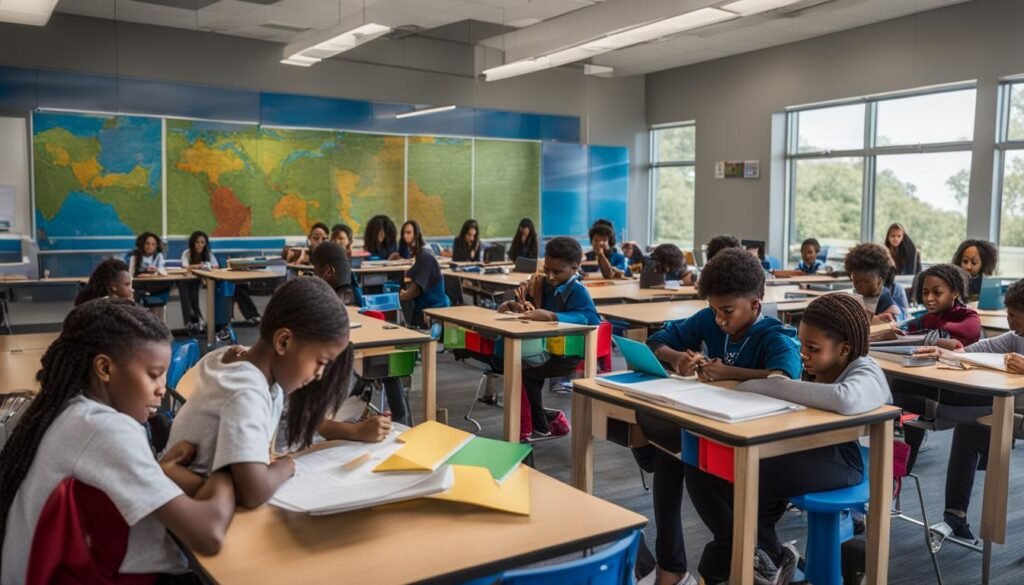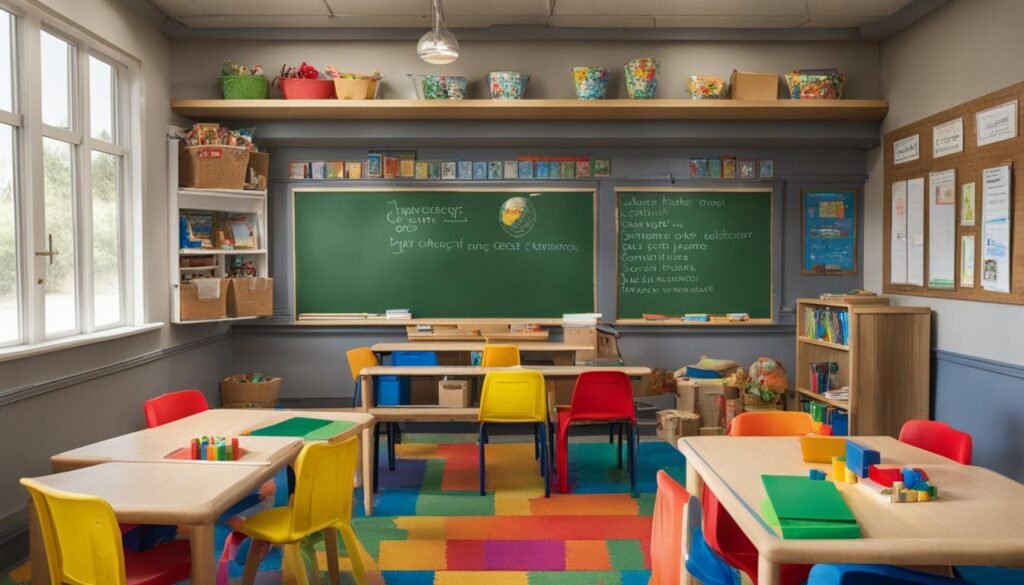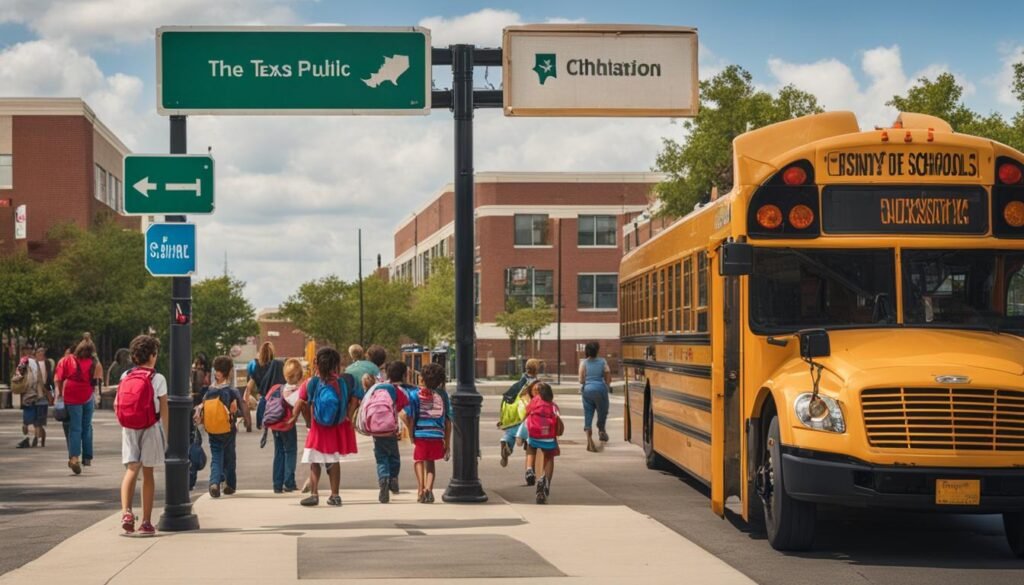Welcome to our comprehensive guide on choosing the right school in Texas! As a parent, finding the perfect educational environment for your child is a top priority. With so many school choices available in the Lone Star State, it can be overwhelming to navigate through the options. That’s why we’re here to help!
Whether you’re considering traditional public schools, public charter schools, public magnet schools, private schools, online learning, homeschooling, or microschools, this guide will provide you with valuable insights and tips to make an informed decision.
Key Takeaways:
- Explore the various school choices available in Texas, including traditional public schools, charter schools, magnet schools, private schools, online learning, homeschooling, and microschools.
- Understand the unique features and considerations of each school option to find the best fit for your child’s needs and educational goals.
- Take advantage of resources such as the Texas School Guide, school websites, open houses, and direct communication with school leaders to gather information and insights.
- Consider factors such as academic programs, extracurricular activities, class sizes, teacher quality, and proximity to your home when evaluating school options.
- Keep in mind that each school option has its own admission process, criteria, and requirements, so be prepared to follow the necessary steps for enrollment.
Traditional Public Schools in Texas
Traditional public schools play a critical role in the Texas education system. Operated by school districts and funded by taxpayers, these schools provide education to a large majority of students in the state. While attending the school closest to their home address is the norm, Texas also offers some flexibility in school selection.
Open Enrollment Policies
Some school districts in Texas have open enrollment policies, allowing students to attend any school within the district, regardless of proximity. This provides an opportunity for parents to explore different schools and choose the one that best fits their child’s needs and interests.
School Transfers
“Parents can also request a transfer for their child to another school if their current school is deemed poorly performing.”
If a student’s current school is deemed to be underperforming, parents have the option to request a transfer to another school within the district. This allows families to seek a better educational environment for their child and ensure they have access to a quality education.
Texas recognizes the importance of investing in public education, with an average expenditure of $11,005 per public school student annually. This funding goes towards maintaining and improving educational facilities, providing resources and support for teachers, and enhancing the overall learning experience for students.
Tips for Selecting a Traditional Public School
When considering traditional public schools in Texas, parents should keep the following tips in mind:
- Research school districts: Explore the academic performance, extracurricular opportunities, and special programs offered by different school districts in Texas.
- Visit schools: Schedule visits to schools of interest to get a feel for the campus environment, meet the staff, and understand the school’s culture.
- Consider school ratings: Look at school performance ratings and rankings to gain insights into the quality of education provided.
- Connect with other parents: Seek recommendations and insights from other parents who have children attending traditional public schools in Texas.
- Review curriculum and programs: Evaluate the curriculum and special programs offered by schools to ensure they align with your child’s educational goals and interests.
By following these tips, parents can make an informed decision when selecting a traditional public school in Texas. Whether it’s a neighborhood school or a transfer to a different district, choosing the right school ensures that children receive a quality education and have the opportunity to thrive academically.
| Advantages of Traditional Public Schools in Texas | Considerations of Traditional Public Schools in Texas |
|---|---|
|
|
Public Charter Schools: Empowering Innovation in Texas
Texas is home to over 700 public charter schools, offering parents and students an array of educational choices. Charter schools are publicly funded institutions that have the freedom to innovate in their teaching methods and curriculum, providing unique learning opportunities for students. With a focus on accountability and performance, charter schools strive to deliver high-quality education and positive outcomes for their students.
Charter schools in Texas operate independently of local school districts and have their own governing boards. They have the flexibility to implement specialized programs and curricula that cater to the diverse needs and interests of students. This innovative approach to education allows charter schools to create a dynamic and engaging learning environment.
Charter schools have limited enrollment capacity, which means that admission is often competitive. Parents who wish to enroll their children in a charter school must go through the admissions process. This typically involves submitting an application, which may include essays, academic records, and letters of recommendation.
If the number of applicants exceeds the available seats in a charter school, many schools use a lottery system for selection. This ensures a fair and transparent process where students are randomly selected for enrollment. The lottery system eliminates any biases and provides equal opportunities for all students, regardless of their backgrounds or circumstances.
Charter schools offer a range of educational programs and focuses, allowing parents and students to find a school that aligns with their interests and aspirations. Some charter schools specialize in specific areas such as STEM (Science, Technology, Engineering, and Mathematics), performing arts, or college preparation. This specialization enables students to explore their passions and develop skills that will benefit them in their future endeavors.

Public charter schools in Texas play a vital role in expanding school choices and promoting educational excellence. They offer an alternative to traditional public schools, providing parents and students with the opportunity to select a school that best fits their educational needs and goals. Charter schools have demonstrated success in improving student outcomes and closing achievement gaps.
“Charter schools empower educators to think creatively and develop innovative educational approaches that can inspire and engage students in meaningful ways. They offer diverse learning environments tailored to individual needs, fostering academic growth and personal development.”
Charter schools are an integral part of the education landscape in Texas, offering families a valuable choice in their pursuit of quality education. They provide parents with the opportunity to actively participate in their child’s education and contribute to their overall academic success.
Benefits of Public Charter Schools in Texas
Public charter schools in Texas offer several benefits that make them an attractive option for parents seeking alternative educational opportunities:
- Specialized Programs: Charter schools often specialize in specific subjects or educational approaches, providing students with unique learning experiences tailored to their interests and abilities.
- Innovation and Flexibility: Charter schools have the freedom to test new educational methods, implement innovative curricula, and adapt their programs to meet the evolving needs of students.
- Increased Parental Involvement: Charter schools encourage active parental involvement in their child’s education, fostering a strong partnership between parents and educators.
- Accountability: Charter schools are held accountable for student performance and outcomes. They undergo regular evaluations to ensure they meet the academic standards set by the state.
- Small Class Sizes: Many charter schools maintain smaller class sizes, allowing for more personalized attention and individualized instruction.
Public charter schools in Texas offer a vibrant educational landscape, providing an array of options for parents and students seeking alternative learning environments. Their focus on innovation, accountability, and student achievement makes them an appealing choice for families looking to provide their children with a high-quality education.
Public Magnet Schools in Texas
Public magnet schools in Texas provide unique educational opportunities through specialized learning tracks. These schools offer programs such as International Baccalaureate or performing arts that cater to students’ interests and talents. While these schools are free to attend, admission may require meeting selective criteria, such as academic performance, auditions, or portfolio submissions.
Many school districts in Texas offer public magnet school options with a wide range of themes and focuses. Students can choose from a variety of magnet programs that align with their passions, including STEM (Science, Technology, Engineering, and Mathematics), visual arts, language immersion, and more. By attending a magnet school, students can explore their interests in a supportive and challenging environment that fosters their growth and achievement.
The Benefits of Public Magnet Schools
- Specialized Learning: Public magnet schools offer in-depth programs and resources in specific subjects, allowing students to further develop their skills and knowledge.
- Diverse Learning Community: Magnet schools often attract a diverse student population, bringing together students from different backgrounds and creating a rich cultural environment.
- Enhanced Opportunities: Magnet programs often provide unique opportunities for internships, field trips, and partnerships with local businesses and organizations.
- College and Career Readiness: The focused education provided by magnet schools prepares students for future success by equipping them with valuable skills and experiences.
“Attending a public magnet school in Texas allows students to pursue their passion and excel in a specialized field while benefiting from a supportive and challenging educational environment.”
– John Smith, Education Specialist
To gain admission to a public magnet school in Texas, parents should research the application process, which typically includes submitting an application, fulfilling any prerequisite requirements, and meeting specified deadlines. It’s essential to review the admission criteria and ensure that your child meets the eligibility requirements for the desired magnet program.
Once admitted, students can explore their chosen fields of interest, engage with like-minded peers, and benefit from rigorous coursework and specialized instruction. Public magnet schools in Texas provide an excellent option for families seeking educational experiences tailored to their child’s unique talents and aspirations.
Private Schools in Texas
Private schools in Texas offer an alternative to public education, providing parents with additional school choices for their child’s education. These schools often boast smaller class sizes, allowing for more personalized attention and fostering a close-knit community. With specialized curricula and a focus on specific educational approaches, private schools cater to various student interests and learning styles.
There are approximately 2,000 private schools in Texas spread across the state, offering a wide range of educational options for families. From religious-affiliated institutions to secular academies, each private school has its own unique mission and values, allowing parents to find a school that aligns with their family’s beliefs and educational goals.
Tuition Costs and Financial Assistance
“Private education can be a valuable investment in your child’s future, but it’s essential for families to understand the financial commitment involved.”
Private school tuition in Texas varies depending on the institution and grade level. On average, elementary schools have tuition rates of around $10,076 per year, while high schools average around $11,515 per year. It’s important for families to consider their financial resources and budget accordingly when considering a private school education for their child.
However, it’s worth noting that financial assistance options exist to help make private school education more accessible. Private scholarships are often available to students based on various criteria such as academic achievement, extracurricular involvement, or financial need. Additionally, families can take advantage of tax-preferred 529 savings accounts specifically designed to support education expenses, including private school tuition.
The Benefits of Private School Education
“Private schools provide a unique educational experience that focuses on the whole child, offering academic rigor, character development, and a supportive community.”
Private schools prioritize academic excellence and foster a challenging learning environment to prepare students for future success. With smaller class sizes, teachers can provide individualized attention, ensuring each student receives the support they need to thrive academically and personally. Additionally, private schools often offer a wider range of extracurricular activities and enrichment programs, allowing students to explore their interests and talents beyond the classroom.
Private schools also emphasize character development and values-based education. They strive to cultivate strong moral character, ethics, and leadership skills in their students. By prioritizing character education, private schools aim to nurture well-rounded individuals who not only excel academically but also contribute positively to their communities.
Furthermore, private schools often have a close-knit and supportive community of students, parents, teachers, and staff. This sense of community fosters strong relationships among all members, creating a supportive network that enhances the overall educational experience.

Choosing the Right Private School
When choosing a private school in Texas, parents should consider the following factors:
- Academic curriculum and programs offered
- Religious or secular affiliation
- Location and proximity to home
- Extracurricular activities and enrichment programs
- Teacher qualifications and student-to-teacher ratios
- Cost of tuition and available financial assistance
- School culture and community
It’s important for parents to thoroughly research and visit potential private schools to get a feel for the school’s environment and educational approach. Open houses and campus tours provide opportunities to interact with teachers, administrators, and current students, allowing parents to gather valuable insights and make an informed decision.
Private schools in Texas offer a diverse array of educational options, allowing parents to choose a school that aligns with their child’s interests, values, and learning needs. Whether it’s a focus on rigorous academic programs, character development, or a specific religious affiliation, private schools provide a unique educational experience that caters to individual students.
Online Learning in Texas
Online learning is a flexible and convenient option for students in Texas, providing a range of school choices through the Texas Virtual School Network. With the increasing popularity of online academies, students can now access quality education from the comfort of their homes or anywhere with an internet connection.
The Texas Virtual School Network offers full-time online schooling opportunities for students of all grade levels. Through this network, students can enroll in tuition-free online schools, such as iUniversity Prep and Texas Connections Academy, which provide comprehensive curriculum and certified teachers. These online academies follow state standards and offer a variety of courses to meet the diverse needs and interests of students.
Benefits of Online Learning
- Flexibility: Online learning allows students to create personalized study schedules that work best for them. They can access their coursework and complete assignments at their own pace, providing flexibility for students who have other commitments, such as part-time jobs or extracurricular activities.
- Access to Qualified Instructors: Texas Virtual School Network ensures that students have access to certified teachers who provide instruction and support throughout the online learning journey. Students can connect with their teachers through video conferences, emails, or online discussion forums.
- Wide Range of Course Options: Online academies offer a comprehensive range of courses, including core subjects, electives, Advanced Placement (AP) courses, and specialized programs. This allows students to explore their interests, challenge themselves academically, and pursue their career aspirations.
- Individualized Learning Experience: Through online learning, students can receive personalized attention and support from their instructors. Teachers can provide one-on-one assistance, identify areas for improvement, and adapt instructional methods to cater to individual learning styles.
- Safe and Inclusive Learning Environment: Online learning provides a safe and inclusive environment for students who may face social or emotional challenges in traditional classroom settings. It eliminates potential distractions and allows students to focus on their studies in a supportive online community.
Texas has recognized the importance of online learning and has recently passed a funding bill to support school districts in covering the costs associated with virtual instruction. This initiative ensures that students who choose online learning as their preferred school option receive the necessary resources and support to succeed academically.
Online learning in Texas offers students the flexibility, accessibility, and quality education they need to thrive in today’s digital age. It provides a viable alternative to traditional brick-and-mortar classrooms and opens up new avenues for students to pursue their educational goals.
Homeschooling in Texas
Homeschooling allows parents to educate their children at home and customize their learning experience. In Texas, homeschooling is one of the school choices available to families seeking alternative education options. With the freedom to design a personalized curriculum, parents can create a tailored learning environment that meets their child’s unique needs and interests.
Unlike traditional schools, homeschooling in Texas does not require standardized testing for homeschooled students. Instead, parents have the flexibility to assess their child’s progress through various methods, such as portfolio evaluations or other alternative forms of assessment.
While homeschooling, parents must follow a specific curriculum that covers the required subjects outlined by the Texas Homeschool Coalition. These subjects typically include math, science, language arts, social studies, and physical education. By adhering to this curriculum, parents ensure that their child receives a comprehensive education that aligns with the state’s educational standards.
It’s important to note that successful completion of a homeschool education in Texas is treated as equivalent to graduation from a public high school. Therefore, homeschooled students have the same opportunities to pursue higher education or enter the workforce as their traditionally schooled peers.
For families considering homeschooling in Texas, there are valuable resources available to provide guidance and support. The Texas Homeschool Coalition offers a wealth of information, including curriculum options, legal requirements, and networking opportunities. Local homeschool associations also provide a sense of community, allowing families to connect with other homeschooling parents and participate in events and activities.
Benefits of Homeschooling in Texas
Homeschooling in Texas offers several advantages for parents and students:
- Customized Learning: Homeschooling provides the freedom to tailor the curriculum to meet a student’s unique learning style and interests.
- Individualized Attention: With a low student-to-teacher ratio, homeschooling allows for personalized instruction and support.
- Flexible Schedule: Homeschooling offers flexibility in setting the daily schedule, allowing for a balance between academic pursuits and other activities.
- Safe Environment: Homeschooling provides a safe and nurturing environment for students, free from potential bullying or negative peer influences.

“Homeschooling allows parents to take an active role in their child’s education, fostering a close parent-child relationship and promoting a love for learning.” – Jane Thompson, Homeschooling Parent
| Pros | Cons |
|---|---|
| Personalized curriculum | Requires significant time commitment from parents |
| Individualized attention | Limited social interaction with peers |
| Flexible schedule | Requires parents to have knowledge in various subjects |
| Safe and nurturing environment | May require additional expenses for curriculum and materials |
Despite the unique benefits homeschooling offers, it may not be the ideal choice for every family. It requires a significant time commitment from parents, as they assume the role of both educator and caregiver. Additionally, homeschooling may limit social interaction with peers, although homeschool associations often organize activities and events to foster social connections among homeschooling families.
Ultimately, the decision to homeschool in Texas is a personal one that should be based on the needs and values of the individual family. By exploring the resources available and understanding the homeschooling laws in Texas, parents can make an informed choice that best supports their child’s educational journey.
Microschools and Mix-and-Match Learning in Texas
Microschools are a unique educational option for students in Texas, offering small, personalized learning environments where students gather in small groups. These schools foster a sense of community and provide individualized attention to each student.

One example of a microschool in Texas is Braveheart Christian Academy. This microschool focuses on academic excellence and character development, offering a blend of traditional and experiential learning. Students at Braveheart Christian Academy participate in hands-on projects, outdoor activities, and community service, fostering a well-rounded education.
Another microschool option in Texas is Wild Roots Collective. This microschool emphasizes nature-based learning and encourages students to explore the outdoors while engaging in hands-on, experiential learning activities. With a focus on sustainability and environmental stewardship, Wild Roots Collective provides a unique educational experience.
Mix-and-match learning is another innovative approach for students in Texas. It involves combining different school options to create a customized educational experience. By mixing homeschooling and online learning, students have the flexibility to tailor their education to their individual needs and interests.
For example, a student may choose to attend a microschool for certain subjects or activities while completing the rest of their coursework through online learning. This mix-and-match approach allows students to benefit from the personalized attention of a microschool while also taking advantage of the flexibility and resources available through online learning.
In summary, microschools in Texas provide small, personalized learning environments, while mix-and-match learning allows for a customized educational experience. These options offer unique approaches to learning and provide students with opportunities for personalized attention and flexibility.
Understanding School Choice in Texas
School choice in Texas provides parents with a range of options to ensure their children receive the education that best suits their individual needs. By exploring the different school options available, parents can make informed decisions about their child’s educational journey. From traditional public schools to charter schools, magnet schools, private schools, online learning, and homeschooling, Texas offers a diverse education landscape.
Traditional Public Schools
Traditional public schools in Texas are operated by school districts and funded by taxpayers. Students usually attend the school closest to their home, but some districts have open enrollment policies that allow for school choice within the district. If a parent feels their child’s current school is underperforming, they can request a transfer to another school.
Charter Schools
Charter schools are publicly funded, but they have greater freedom in their curriculum and teaching methods. These schools often have limited enrollment and use a lottery system if there are more applicants than available seats. Parents must apply for admission to charter schools, providing an alternative to traditional public schools.
Magnet Schools
Public magnet schools in Texas specialize in specific areas such as fine arts, science, or language immersion programs. Admission to magnet schools may be selective based on criteria such as grades or auditions. These schools offer unique educational experiences and opportunities for students who excel in particular fields.
Private Schools
Private schools in Texas offer an alternative to public education. These schools typically have smaller class sizes, specialized curricula, and may require tuition fees. With approximately 2,000 private schools in the state, parents have a wide range of educational options to choose from.
Online Learning
Online learning has become increasingly popular, especially in recent times. Texas offers online schooling options through the Texas Virtual School Network, where students can enroll in tuition-free online schools. Additionally, some school districts and charter networks provide online learning programs.
Homeschooling
Homeschooling allows parents to educate their children at home according to their own curriculum. Texas allows homeschooling and treats successful completion of a homeschool education as equivalent to graduation from a public high school. Various resources and support groups exist to assist homeschooling families.
By researching and understanding these various school options, parents in Texas can make informed decisions regarding their child’s education. They can explore school websites, attend open houses, and reach out to school leaders for additional information.

“Education is the key to unlock the golden door of freedom.” – George Washington Carver
Conclusion
Choosing the right school for your child is a crucial decision that can have a lasting impact on their education and future. In Texas, the wide range of school options allows parents to find a learning environment that best suits their child’s needs and goals.
By exploring the different types of schools available, such as traditional public schools, charter schools, magnet schools, private schools, online learning, and homeschooling, parents can make an informed decision. Each option has its own unique features and considerations, from the proximity and curriculum of traditional public schools to the specialized programs and selective admissions of magnet schools.
To navigate the Texas education system and find the best educational environment for your child, there are resources and support available. Websites, open houses, and direct communication with school leaders can provide valuable information and insights. Additionally, organizations like the Texas Homeschool Coalition and local homeschool associations offer guidance and support for families exploring homeschooling as an option.
Armed with this guide for parents to Texas schools and school selection tips, you can confidently embark on the journey of choosing the right school for your child. Remember that there is no one-size-fits-all approach, and what works for one child may not work for another. Consider your child’s unique needs, interests, and learning style, and keep their educational goals at the forefront. With careful consideration and the wealth of options available, you can find a school that nurtures your child’s potential and sets them on the path to success.








